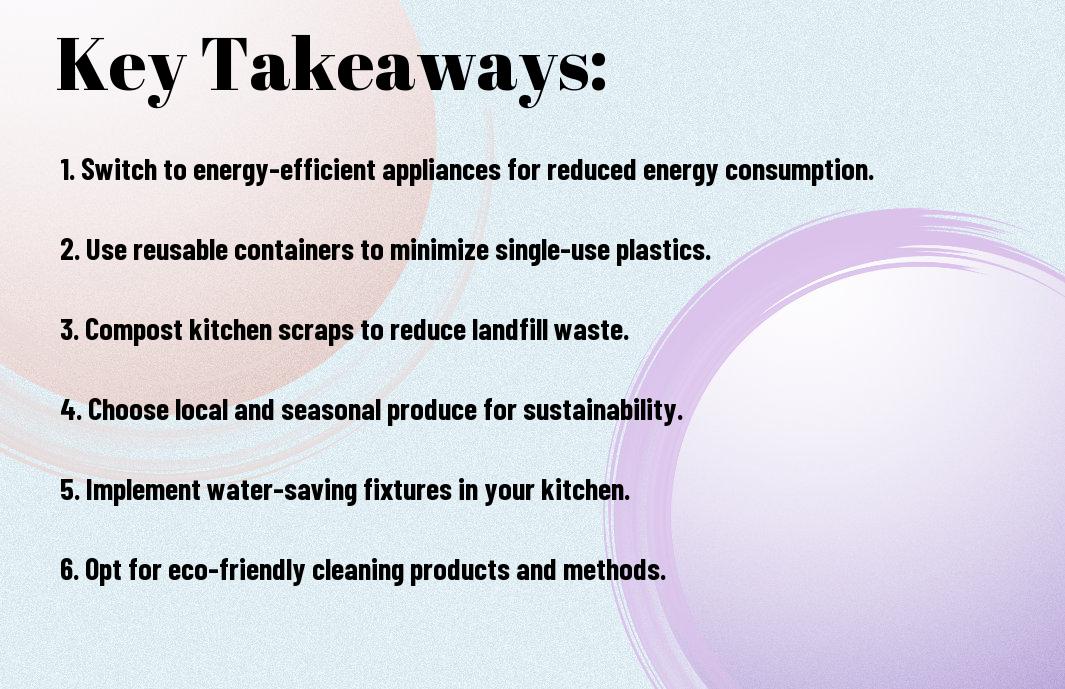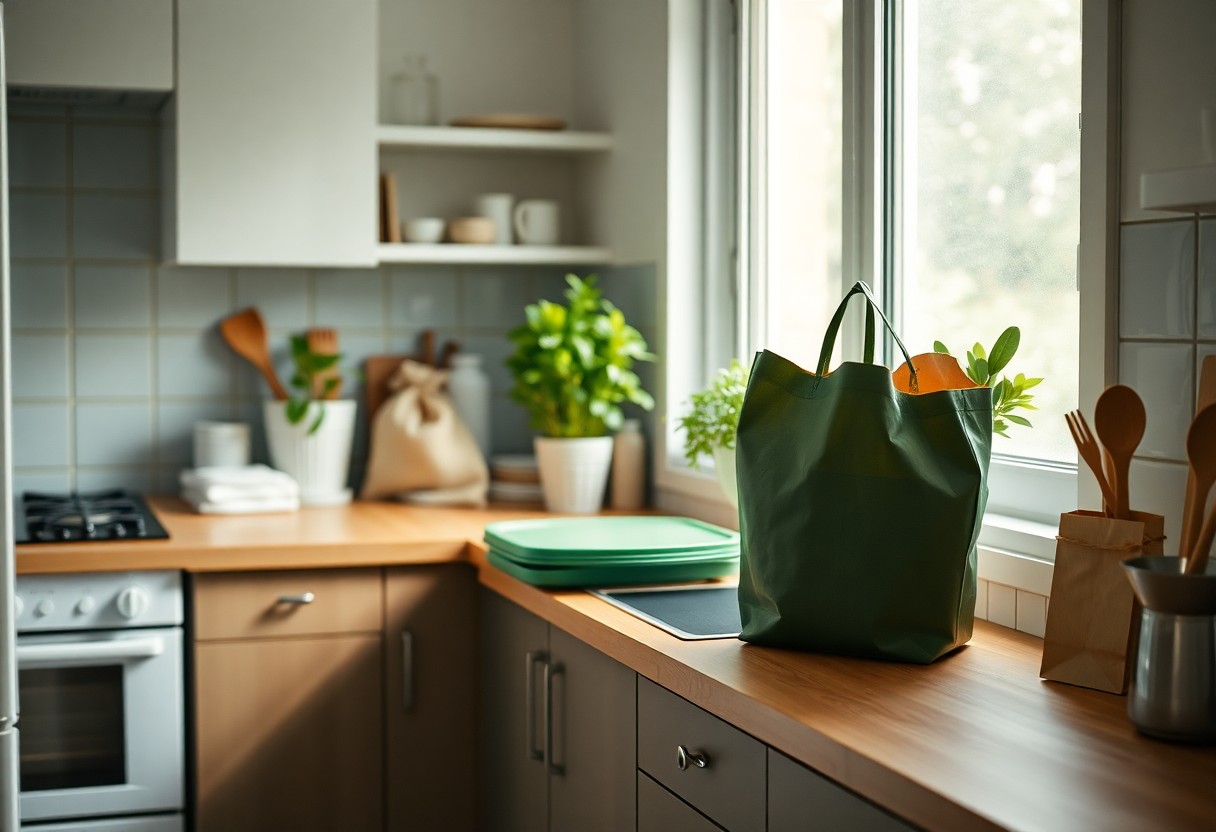You can significantly reduce your environmental footprint by making a few simple changes in your kitchen. Your daily habits, from food storage to waste management, have a significant impact on the planet. By implementing sustainable practices, you can minimize waste, reduce energy consumption, and create a healthier cooking space. You will learn how to make eco-friendly choices and implement them in your daily kitchen routine, starting with small steps that can lead to a more sustainable kitchen.
Key Takeaways:
To create a more sustainable kitchen, consider the following points:
- Opt for energy-efficient appliances to reduce your kitchen’s carbon footprint and lower your energy bills.
- Use eco-friendly cleaning products that are free from harsh chemicals and better for the environment.
- Implement a recycling system to minimize waste and encourage the reuse of materials such as glass, plastic, and paper.
- Choose locally sourced ingredients to support the local economy and reduce the carbon emissions associated with transportation.
- Reduce food waste by planning meals, using up leftovers, and composting food scraps to create nutrient-rich soil for your garden.
Assessing Your Kitchen
The first step in making your kitchen more sustainable is to assess your current kitchen setup and habits. This involves taking a closer look at your kitchen’s layout, appliances, and practices to identify areas where you can make changes.
Identifying areas for improvement
Between the kitchen’s layout and your daily habits, there are likely several areas where you can make adjustments to increase sustainability. You will need to look at your storage, waste management, and energy usage to determine where to start making changes.
Evaluating your current habits
Assessing your daily kitchen routines will help you understand where you can make sustainable changes. You should consider your food shopping habits, cooking methods, and waste disposal practices to identify opportunities for improvement.
It is imperative to take an honest look at your habits, including your use of single-use plastics, food waste, and energy consumption. By doing so, you will be able to pinpoint specific areas where you can make adjustments to create a more sustainable kitchen that aligns with your values and goals, allowing you to make meaningful changes that benefit your health and the environment.

Reducing Waste
Even small changes in your kitchen can make a significant impact on the environment. You can start by being more mindful of your daily habits and making a few simple adjustments to reduce your waste output.
Minimizing single-use plastics
Between reusable bags and containers, you can significantly reduce your reliance on single-use plastics. You can opt for beeswax wraps, cloth towels, and metal or glass containers to store your food and other kitchen items.
Implementing a recycling system
Among the most effective ways to reduce waste is to implement a recycling system in your kitchen. You can start by designating a specific area for recyclables and making sure to rinse and sort your items properly.
Another step you can take is to educate yourself on what materials are recyclable in your area and make sure to participate in your community’s recycling program. You can also consider composting food waste to reduce the amount of trash that ends up in landfills and create a nutrient-rich soil for your garden.
Sustainable Food Choices
Keep in mind that the food you choose to buy and prepare has a significant impact on the environment. You can make a difference by choosing sustainable food options and reducing your carbon footprint.
Buying locally sourced produce
Around the corner from your home, you can find local farmers’ markets or groceries that sell locally sourced produce, which not only supports your community but also reduces transportation emissions.
Reducing food waste through meal planning
Locally, you can start by planning your meals for the week, making a grocery list, and sticking to it, which will help you avoid buying too much food that may go to waste.
In fact, planning your meals and making a list will also help you save time and money, as you will be more intentional with your grocery shopping and less likely to impulse buy, allowing you to make the most of the food you purchase and minimize waste.
Eco-Friendly Cleaning
Despite the abundance of chemical-based cleaning products available, you can make a significant impact on the environment by adopting eco-friendly cleaning practices in your kitchen. This can be achieved by making simple changes to your cleaning routine and the products you use.
Switching to natural cleaning products
Against the conventional options, you can opt for natural cleaning products that are free from harsh chemicals and toxins, making your kitchen a healthier space for you and your family.
Making your own cleaning solutions
Safely, you can create your own cleaning solutions using common household ingredients, reducing your reliance on store-bought products and minimizing waste.
Products like baking soda, vinegar, and lemon juice can be used to create effective and eco-friendly cleaning solutions for your kitchen, allowing you to take control of the ingredients used in your cleaning products and tailor them to your specific needs, giving you peace of mind and a cleaner, more sustainable kitchen.

Energy and Water Efficiency
Now, making your kitchen more sustainable involves reducing your energy and water consumption. You can start by assessing your current usage and identifying areas for improvement. This will help you make informed decisions about where to focus your efforts, ensuring a more efficient and eco-friendly kitchen.
Using energy-efficient appliances
For instance, you can replace traditional incandescent bulbs with LED ones and upgrade to energy-efficient appliances, such as refrigerators and dishwashers, to minimize your energy consumption. You can also look for appliances with the ENERGY STAR label, which indicates that they meet energy efficiency standards set by the U.S. Environmental Protection Agency.
Conserving water through simple changes
One simple way to conserve water in your kitchen is by fixing leaky faucets and installing low-flow fixtures. You can also install a faucet with an aerator, which can help reduce water flow while maintaining water pressure, making your kitchen more water-efficient.
But to take your water conservation efforts to the next level, you should also focus on changing your daily habits. You can start by turning off the tap while washing dishes or rinsing vegetables, and scraping food off plates instead of rinsing them under running water. By implementing these small changes, you can significantly reduce your water consumption and make a positive impact on the environment.
Maintenance and Upkeep
Unlike other areas of your home, your kitchen requires frequent maintenance to ensure it remains sustainable. You can find helpful tips on making your kitchen more eco-friendly at 20 ideas to help you go green in the kitchen, which will guide you in creating a more environmentally friendly space.
Regularly cleaning and maintaining appliances
Cleansing your appliances regularly will help prevent the buildup of bacteria and debris, making them more efficient and reducing your environmental footprint. You can start by wiping down your counters and sinks daily, and deep cleaning your appliances weekly.
Scheduling annual check-ups for equipment
Upkeeping your equipment is crucial to ensure it continues to function properly and efficiently. You should schedule annual check-ups for your major appliances to prevent any potential issues and reduce the need for repairs or replacements.
Equipment that is well-maintained will not only last longer, but it will also consume less energy and water, reducing your utility bills and minimizing your impact on the environment. You can start by checking your equipment’s user manual for maintenance instructions, and scheduling regular check-ups with a professional to ensure your equipment is running at its best.
Final Words
To wrap up, you have now gained insight into making your kitchen more sustainable. You can start by implementing simple changes, such as reducing food waste and using eco-friendly products. As you continue to make these adjustments, your kitchen will become a more environmentally conscious space. By taking ownership of your kitchen’s sustainability, you will not only reduce your environmental impact, but also create a healthier space for your family to enjoy.
FAQ
Q: What are some simple ways to reduce waste in my kitchen to make it more sustainable?
A: To reduce waste in your kitchen, start by implementing a few simple practices. Begin with composting food scraps and using reusable bags for grocery shopping. Additionally, opt for products with minimal or biodegradable packaging. You can also reduce paper waste by switching to digital recipes and shopping lists. Lastly, consider purchasing items in bulk and using glass containers for storage to minimize single-use plastics.
Q: How can I make my kitchen appliances more energy efficient to contribute to a sustainable kitchen?
A: Making your kitchen appliances more energy efficient is key to a sustainable kitchen. One way to do this is by upgrading to energy-star rated appliances when it’s time for replacements. In the meantime, ensure that you’re using your current appliances efficiently. This includes turning off appliances when not in use, using power strips to plug in small appliances, and adjusting your refrigerator and freezer to the optimal temperatures. Regular maintenance, such as cleaning the refrigerator coils and checking door seals, can also improve appliance efficiency.
Q: What changes can I make in my cooking habits to make my kitchen more sustainable and environmentally friendly?
A: Changing your cooking habits can significantly contribute to a more sustainable kitchen. Start by planning your meals around seasonal and locally sourced ingredients, which not only supports local farmers but also reduces the carbon footprint associated with long-distance food transportation. Adopting plant-based diets or reducing meat consumption can also lower your kitchen’s environmental impact, as animal agriculture is a significant contributor to greenhouse gas emissions. Additionally, learning to cook in bulk and using up leftovers can help minimize food waste. Consider using eco-friendly cooking methods like steaming or pressure cooking, which use less energy than traditional cooking methods. Finally, be mindful of water usage by using a water filter instead of bottled water and fixing leaks promptly.
